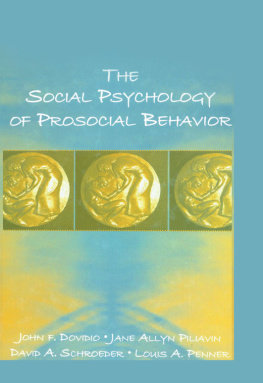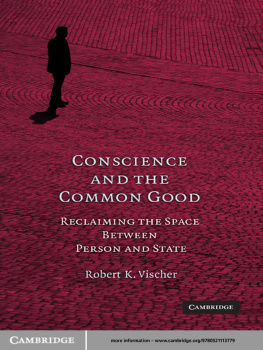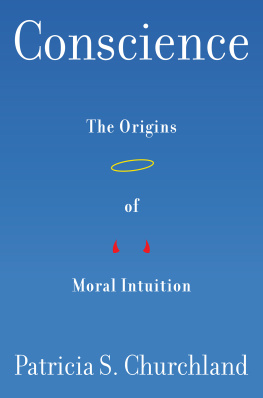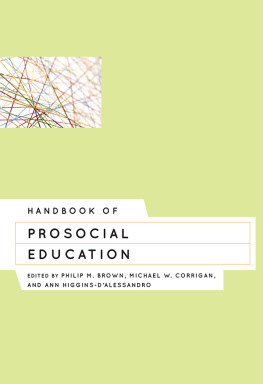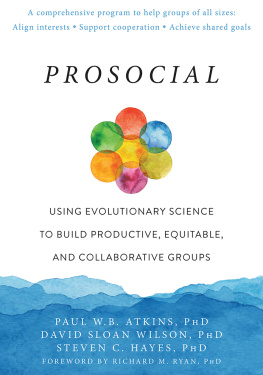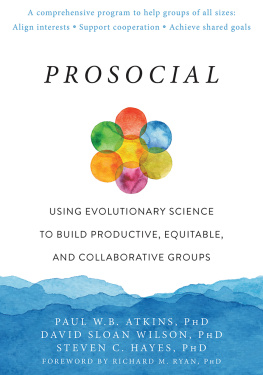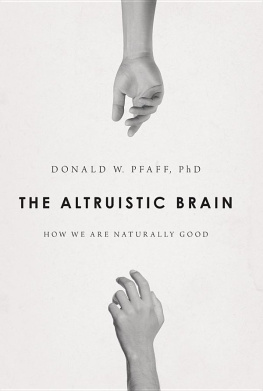CULTIVATING
CONSCIENCE
CULTIVATING
CONSCIENCE
How Good Laws Make Good People
Lynn Stout

Copyright 2011 by Princeton University Press
Published by Princeton University Press, 41 William Street,
Princeton, New Jersey 08540
In the United Kingdom: Princeton University Press, 6 Oxford Street,
Woodstock, Oxfordshire OX20 1TW
press.princeton.edu
All Rights Reserved
Library of Congress Cataloging-in-Publication Data
Stout, Lynn A., 1957
Cultivating conscience : how good laws make good people /
Lynn Stout.
p. cm.
Includes bibliographical references and index.
ISBN 978-0-691-13995-1 (hardback : alk. paper) 1. Conscience.
2. Law and ethics. 3. LawMoral and ethical aspects. I. Title.
BJ1471.S725 2011
2010021515
British Library Cataloging-in-Publication Data is available
This book has been composed in Scala
Printed on acid-free paper.
Printed in the United States of America
1 3 5 7 9 10 8 6 4 2
CONTENTS
ACKNOWLEDGMENTS
This book took some time to conceive and to write. As I explored the idea of conscience and sorted through the scientific evidence on conscience and its relationship to law, I was aided immeasurably by the suggestions, questions, and insights of many people. These include my marvelous colleagues at UCLA and at Georgetown; participants at workshops at those schools, at the Institute for Advanced Studies, and at Chapman Law School, Claremont University, Harvard Law School, New York University, Stanford Law School, Vanderbilt Law School, and Washington University; various individuals affiliated with the Gruter Institute, the Alfred P. Sloan Foundation, and UCLAs Behavior, Evolution and Culture program; and the wondrous Treynor family. I am deeply grateful to all for their insights and encouragement, and apologize to any whom I have failed to mention.
Most particularly, however, my research was inspired and influenced by my conversations with especially pioneering and intellectually courageous economists who encouraged me to look beyond the homo economicus model, including George Akerlof, Margaret Blair, Harold Demsetz, Bill Dickens, Robert Frank, Herb Gintis, Mike Jensen, Douglass North, Isabel Sawhill, Paul Zak, Luigi Zingales, and the much-missed Jack Hirshleifer. This book is dedicated to them. It is also dedicated to the memory of my mother, Sally Cowan Stouta woman who knew a thing or two about conscience.
is drawn from an earlier work, a chapter that I wrote for the book Moral Markets: The Critical Role of Values in the Economy (ed. Paul J. Zak, Princeton University Press, 2008).
PART ONE
CHAPTER ONE
FRANCOS CHOICE
We should expect the best and the worst from mankind, as from the weather.
Marquis De Vauvenargues
On a quiet August evening in 2002, Franco Gonzales stood on the corner of Seventh Street and Grand Avenue in downtown Los Angeles, waiting for the bus. Los Angeles is a city of suburban commuters, and by nine p.m. the corner of Seventh and Grand was deserted. Suddenly an armored truck drove by. Its rear door swung open mysteriously, and a plastic bag fell out to land at Gonzales feet. Inside the bag was $203,000 in cash.
Franco Gonzales took the money home. Gonzales, a plump, boyish man in his early twenties who worked as a dishwasher in a restaurant, spent the rest of the night agonizing over what to do. He wanted to keep the money for himself and for his mother, who lived in a farming village in Mexico. But Gonzales mother had taught him that stealing was wrong. He worried that keeping the money would be dishonest. He also worried about what would happen if the police somehow learned that Gonzales, who was working in the United States without legal documentation, had acquired sudden wealth. Finally, it does not seem implausible that Gonzales, raised a Catholic, worried about his immortal soul.
By the time the sun rose, Gonzales had made his decision. He called 911 to report his find and asked the police to return the money to its rightful owner.
ENTER HOMO ECONOMICUS
When I first studied economics in the late 1970s, my instructors taught me that people generally do not behave like Franco Gonzales. Rather (my professors told me), most people act like members of the species homo economicus: they act selfishly and rationally. Economic Man does not worry about morality, ethics, or other people. He worries only about himself, calculatingly and opportunistically pursuing the course of action that brings him the greatest material advantage.
My professors and I both knew, of course, that homo sapiens does not always act like homo economicus. Franco Gonzales certainly did not. Although his decision to return the money might have been inspired by a number of subjective motives one could describe as selfish (e.g., a desire to avoid guilt or obsessive worry, or the hope of earning praise or eternal salvation), by returning the cash he had made himself poorer by $203,000. From an objective perspective, he had acted unselfishly. Nevertheless, my professors insisted, individuals like Franco Gonzales were the exceptions that proved the rule. Most people, most of the time, tried to maximize their own wealth. Self-sacrificing behavior was rare, unpredictable, and unworthy of serious study.
As an undergraduate student studying the exchange of goods and services in anonymous markets, the homo economicus approach struck me as a fairly plausible description of real behavior. These days, however, the assumption that people are fundamentally self-interested has spread well beyond economics. In political science, Ph.D. dissertations analyze politicians and bureaucrats as rational, self-interested actors. Public policy departments and business schools incorporate economic theory into their basic curricula and serve up the homo economicus account as standard fare. In the nations law schools, students are routinely instructed in law and economics, an approach that treats law as a kind of pricing system that requires people to pay damages for negligence or breach of contract in order to increase the price of bad behavior.
Today we see the results of this intellectual evolution. Over the past quarter-century, the precepts of economics have been drilled into the heads of millions of undergraduate and graduate students. A generation weaned on the idea of rational selfishness has graduated from our nations universities and moved into leadership positions in the worlds of law, business, government, and higher education. They have brought with them an unquestioned belief in the power of material incentives that undergirds almost every policy discussion. Are people cheating on their taxes? Increase the penalty for tax fraud. Are CEOs taking dangerous risks with their firms? Incentivize them with deferred stock grants. Are Americas children failing to learn their ABCs? Tie teachers salaries to their students test scores.
SIGNS OF CONSCIENCE
Largely missing from all this talk of incentives and accountability is any serious discussion of the possibility that we might encourage or discourage particular behaviors by appealing not to selfishness, but instead to the force of conscience. Many modern experts would snicker at the very idea. Conscience is viewed as the province of religious leaders and populist politicians, not lawyers, businessmen, or regulators.
Yet before dismissing conscience, it is worth stopping to recognize that, for most of us, ethical and moral concerns are an omnipresent theme of our everyday lives. If you doubt this, simply consider your own train of thought on a typical day. Your interior monologue is likely to include scores, if not hundreds, of normative judgments. (That driver is a jerk; its thoughtless of my neighbor to leave her empty garbage cans out; that cashier was a nice guy; I really ought to call my Aunt Martha.) Our language similarly reveals our preoccupation with moral assessments. Just as the Inuit are said to have many nouns for snow, English has a multitude of words to describe unselfish, conscience-driven behavior, including:
Next page


